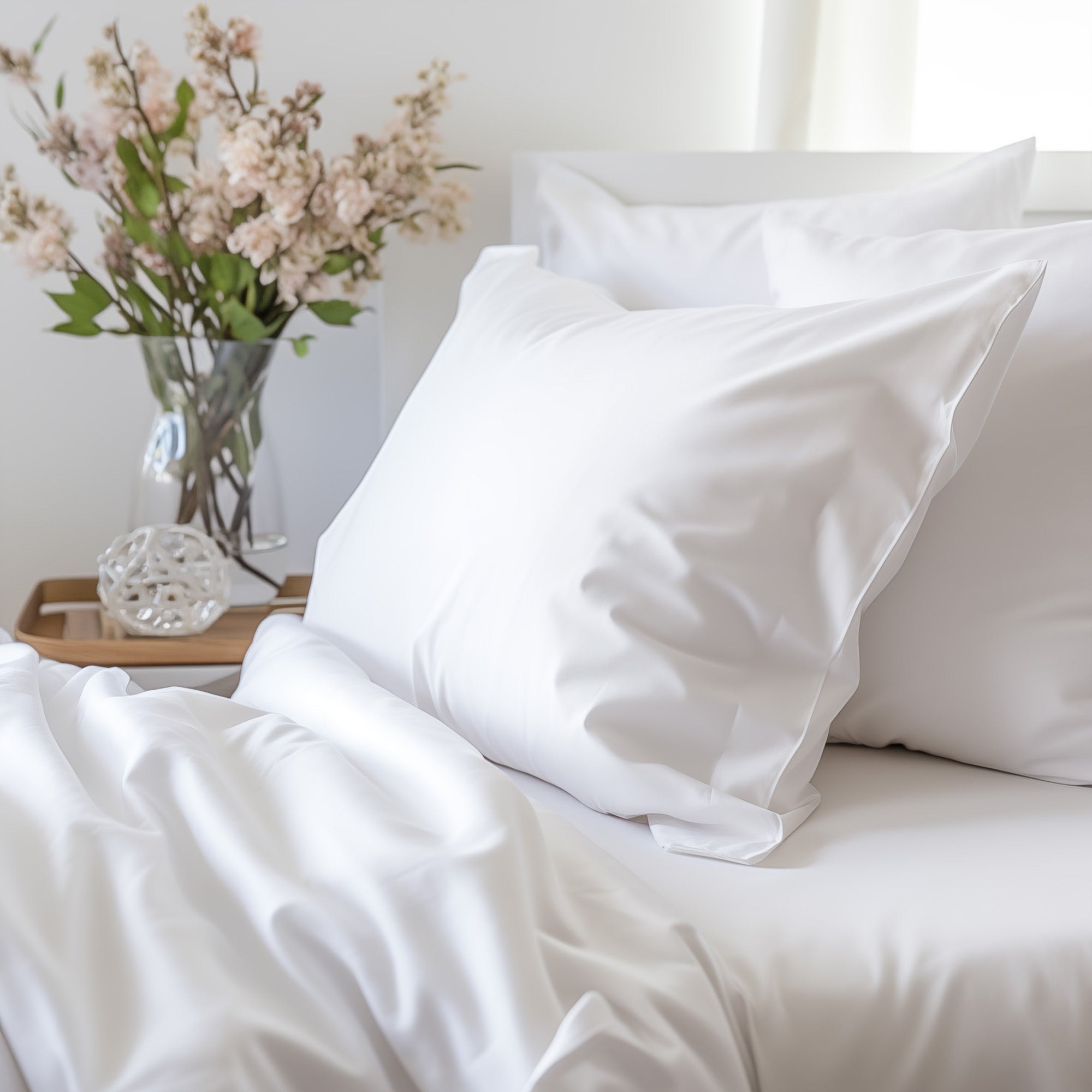To get a good night’s sleep, the materials you choose for your bed sheets can make a world of difference. Eucalyptus bedding and bamboo bed sheets are becoming the fabrics of choice for those who prioritize both comfort and sustainability.
If you’ve ever been confused by the variety of sheet options available, you’re not alone. But how do they stack up against each other? Stick around for a side-to-side comparison of bamboo and eucalyptus sheets.
The Growing Trend of Eco-Friendly Bedding
Manufacturing traditional cotton sheets is a resource-intensive process as cotton crops are notorious for their excessive water usage and pesticide dependence. Bamboo and eucalyptus fibers are eco-friendly, biodegradable, and renewable resources. Today, many people are shifting towards more sustainable alternatives like eucalyptus and bamboo.
Eco-friendly bedding materials aren’t just good for the planet; they’re also better for you. Bamboo and eucalyptus, for example, are naturally hypoallergenic and moisture-wicking, offering a comfortable sleeping environment while lowering your carbon footprint. Both bamboo and eucalyptus sheets are ideal for individuals with sensitive skin due to their hypoallergenic properties.
What Are Bamboo Sheets?

The popularity of bamboo bedding has surged in recent years, and for good reason. Bamboo fabric is known for its breathability, softness, antibacterial properties, and allergen-free features. Bamboo is not just a renewable resource; it also brings a host of ecological benefits, including soil stabilization and carbon sequestration.
Key Features of Bamboo Sheets
On top of being eco-friendly, bamboo sheets are incredibly soft, often compared to cashmere or silk, and provide a luxurious feel that many people prefer over traditional cotton sheets.
Furthermore, bamboo’s natural moisture-wicking abilities and soft texture make these sheets excellent at regulating body temperature. No more waking up in the middle of the night, drenched in sweat! Bamboo sheets wick moisture away from your skin, leaving you dry and comfortable until morning.
What Are Eucalyptus Sheets?
If bamboo sheets have taken the eco-friendly bedding world by storm, eucalyptus bedding sheets are certainly not far behind. Eucalyptus fibers are extracted from eucalyptus wood through the lyocell process, making them eco-friendly and sustainable. Like bamboo, eucalyptus is also a rapidly renewable resource. Eucalyptus trees can grow quickly with less water, making them a sustainable choice for bed sheets. Eucalyptus sheets, also known as Tencel sheets, are often compared favorably to other types of sheets like cotton.
Key Features of Eucalyptus Sheets
One of the most notable advantages of eucalyptus sheets is their natural cooling effect, making eucalyptus sheets cooler compared to other fabrics. Eucalyptus fabric provides a cool and breathable sensation when in contact with the skin and possesses natural antibacterial properties. If you’re someone who struggles with overheating at night, eucalyptus sheets can be a game-changer. They have the ability to regulate body temperature by being highly breathable.
Eucalyptus sheets are also known for their antimicrobial properties. In simple terms, they naturally resist mold and mildew, as well as odors and bacteria. And if durability is a concern, eucalyptus sheets are incredibly strong and long-lasting, giving you peace of mind that you’re making a wise, long-term investment for your home.
Bamboo vs Eucalyptus: A Comparative Analysis
Navigating the choice between eucalyptus vs bamboo sheets can seem daunting with both bringing unique attributes to the table. Here, we’ll compare them on a variety of criteria:
Sustainability
The production process for both bamboo and eucalyptus sheets involves environmentally friendly methods, with minimal use of chemicals.
Bamboo: Touted for its rapid renewability, bamboo outpaces traditional cotton significantly in terms of water conservation.
Eucalyptus: While eucalyptus is certainly a rapidly renewable resource with minimal water requirements, it doesn’t quite match bamboo’s impressive environmental credentials.
Comfort and Moisture Wicking
Bamboo: Bamboo’s claim to fame lies in its unrivaled softness and exceptional moisture-wicking prowess.
Eucalyptus: While eucalyptus boasts of natural cooling and breathability, it doesn’t quite rival the soft embrace of bamboo. However, eucalyptus sheets are softer than many other materials and offer a slightly more luxurious feel, making them a comfortable choice for a restful night.
Durability
Bamboo: Owing to its sturdy fibers, bamboo sheets promise longevity, ensuring years of uninterrupted comfort.
Eucalyptus: Comparable in durability, eucalyptus does hold its own against wear and tear.
Cost
Bamboo: Bamboo typically wins in the affordability category, offering remarkable value for your investment.
Eucalyptus: Although slightly pricier, it brings its own set of benefits like cooling properties and antimicrobial defenses.
Care
Bamboo: With specific yet straightforward care guidelines, bamboo sheets are a breeze to maintain.
Eucalyptus: While also easy to care for and notably resistant to mold and mildew, eucalyptus can’t be taken as lightly as bamboo in maintenance.
In the debate of bamboo versus eucalyptus, both contenders have strong selling points. But if you’re angling for a blend of sustainability, superior comfort, and value for money, bamboo might just be the perfect fit for your bedding needs. If you’d like to learn more about how bamboo sheets stand against other types of sheets, check out this article comparing them to linen sheets.
The Coolest Option: Bamboo or Eucalyptus for Hot Sleepers?
Every hot sleeper knows the nightly struggle to find that elusive cool spot on the bed. If that’s you, then bamboo or eucalyptus sheets might have caught your eye due to their excellent cooling properties. Both materials champion breathability and moisture-wicking, but one has a subtle advantage that might sway your choice.
Bamboo Sheets: Cooling Masters
Bamboo sheets have earned accolades for their remarkable breathability and their prowess in moisture management. Thanks to the intrinsic design of bamboo fibers, these sheets promise unmatched air circulation.
This ensures that sweat and moisture get efficiently warded off. With bamboo, you not only get sheets that breathe but ones that adapt, helping maintain an optimal sleeping temperature.
The Refreshing Touch of Eucalyptus Sheets
Eucalyptus sheets, on the other hand, are often considered cooler than other fabrics due to their naturally cool essence. Their unique composition provides an almost immediate cooling touch upon skin contact. For those who often find themselves in a nightly struggle with heat, this can be a game-changer.
So, Which One Takes the Cooling Crown?
Both bamboo and eucalyptus have impressive cooling capabilities. But if the scales were to tilt, bamboo might just inch ahead. While eucalyptus offers an immediate cooling touch, bamboo’s adaptive temperature regulation and superior moisture-wicking provide sustained, all-night comfort. So, for those seeking consistency and adaptability in their cool, bamboo might be the one to pledge allegiance to.
How to Care for Eucalyptus and Bamboo Sheets
Taking good care of your sheets not only prolongs their life but also makes for a more sustainable choice in the long run. By adhering to proper care instructions, you can ensure your bed sheets remain comfortable and vibrant for years to come.
Cleaning and Maintaining Bamboo Sheets
Bamboo sheets are generally easy to take care of but do require some special considerations. To maintain their softness and special properties, it’s best to wash them in cold water on a gentle cycle.
Avoid using bleach or a fabric softener as they can weaken the fibers over time. Air drying is recommended, although a tumble dry on low heat can also be used.
Cleaning and Maintaining Eucalyptus Sheets
Eucalyptus sheets are known for their natural cooling effects and antimicrobial properties. Eucalyptus sheets typically have a long lifespan and are durable, provided they are cared for properly. For best results, wash these sheets in cold water and avoid using bleach or harsh detergents. You can tumble dry them on low, or better yet, air dry them to maintain the integrity of the fibers and ensure longevity.
The Final Verdict: Bamboo or Eucalyptus?
Both eucalyptus and bamboo bed sheets have their merits when it comes to providing a cool night’s sleep. Eucalyptus sheets are also soft and comfortable, with some suggesting that they have a more luxurious feel compared to bamboo sheets. However, if we consider additional factors like comfort, maintenance, and cost, bamboo sheets seem to have a slight edge over their counterparts.
Bamboo’s naturally soft texture offers an incomparable level of comfort, making it a luxurious experience for hot sleepers. Unlike eucalyptus, which can sometimes feel slippery, bamboo maintains a soft, cozy feel that’s inviting to the touch.
Lastly, bamboo sheets are often more budget-friendly. While both types of sheets are more expensive than traditional cotton sheets due to their specialized features, bamboo sheets are generally cheaper than their eucalyptus counterparts.
High-quality Bamboo Sheets Available at Earthly Threads
Because we believe bamboo makes for the best bedding sheets in terms of both comfort and sustainability, we have made it our mission to provide a variety of high-quality bamboo sheets. At Earthly Threads, our bamboo sheet sets meet the highest standards of quality and ethical sourcing, ensuring you sleep peacefully in more ways than one.


